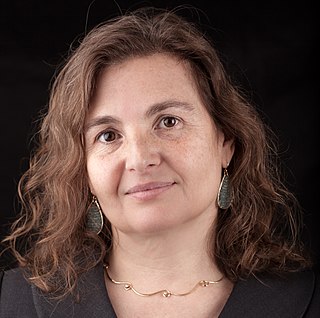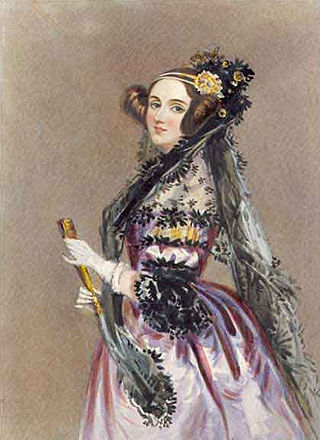Related Research Articles

Helen Greiner is a co-founder of iRobot and former CEO of CyPhy Work, Inc., a start-up company specializing in small multi-rotor drones for the consumer, commercial and military markets. Ms Greiner is currently the CEO of Tertill Corporation.

Rosalind Wright Picard is an American scholar and inventor who is Professor of Media Arts and Sciences at MIT, founder and director of the Affective Computing Research Group at the MIT Media Lab, and co-founder of the startups Affectiva and Empatica.

Ayanna MacCalla Howard is an American roboticist, entrepreneur and educator currently serving as the dean of the College of Engineering at Ohio State University. Assuming the post in March 2021, Howard became the first woman to lead the Ohio State College of Engineering.

Diane B. Greene is an American technology entrepreneur and executive. Greene started her career as a naval architect before transitioning to the tech industry, where she was a founder and CEO of VMware from 1998 until 2008. She was a board director of Google and CEO of Google Cloud from 2015 until 2019. She was also the co-founder and CEO of two startups, Bebop and VXtreme, which were acquired by Google and Microsoft, for $380 million and $75 million.

Daniela L. Rus is a roboticist and computer scientist, Director of the MIT Computer Science and Artificial Intelligence Laboratory (CSAIL), and the Andrew and Erna Viterbi Professor in the Department of Electrical Engineering and Computer Science (EECS) at the Massachusetts Institute of Technology. She is the author of the books Computing the Future and The Heart and the Chip.

Andrew Yan-Tak Ng is a British-American computer scientist and technology entrepreneur focusing on machine learning and artificial intelligence (AI). Ng was a cofounder and head of Google Brain and was the former Chief Scientist at Baidu, building the company's Artificial Intelligence Group into a team of several thousand people.

Massimiliano Versace is the co-founder and the CEO of Neurala Inc, a Boston-based company building Artificial Intelligence emulating brain function in software and used in automating the process of visual inspection in manufacturing. He is also the founding Director of the Boston University Neuromorphics Lab. Massimiliano Versace is a Fulbright scholar and holds two PhD in Experimental Psychology from the University of Trieste, Italy and Cognitive and Neural Systems from Boston University, USA. He obtained his BSc from the University of Trieste, Italy.
Maja Matarić is an American computer scientist, roboticist and AI researcher, and the Chan Soon-Shiong Distinguished Professor of Computer Science, Neuroscience, and Pediatrics at the University of Southern California. She is known for her work in human-robot interaction for socially assistive robotics, a new field she pioneered, which focuses on creating robots capable of providing personalized therapy and care that helps people help themselves, through social rather than physical interaction. Her work has focused on aiding special needs populations including the elderly, stroke patients, and children with autism, and has been deployed and evaluated in hospitals, therapy centers, schools, and homes. She is also known for her earlier work on robot learning from demonstration, swarm robotics, robot teams, and robot navigation.
Marita Cheng is the founder of Robogals. She was named the 2012 Young Australian of the Year. She is the founder and current CEO of Aubot, a start-up robotics company. She co-founded Aipoly, an app to assist blind people to recognise objects using their mobile phones. She was named as one of the World's Top 50 women in Technology by Forbes in 2018 and was recognized on the Forbes 30 Under 30 list in 2016. On 9 June 2019, Cheng was appointed a member of the Order of Australia for significant service to science and technology, particularly to robotics.

This is a timeline of women in computing. It covers the time when women worked as "human computers" and then as programmers of physical computers. Eventually, women programmers went on to write software, develop Internet technologies and other types of programming. Women have also been involved in computer science, various related types of engineering and computer hardware.

Kate Devlin, born Adela Katharine Devlin is a Northern Irish computer scientist specialising in Artificial intelligence and Human–computer interaction (HCI). She is best known for her work on human sexuality and robotics and was co-chair of the annual Love and Sex With Robots convention in 2016 held in London and was founder of the UK's first ever sex tech hackathon held in 2016 at Goldsmiths, University of London. She is Senior Lecturer in Social and Cultural Artificial Intelligence in the Department of Digital Humanities, King's College London and is the author of Turned On: Science, Sex and Robots in addition to several academic papers.

Joy Adowaa Buolamwini is a Canadian-American computer scientist and digital activist formerly based at the MIT Media Lab. She founded the Algorithmic Justice League (AJL), an organization that works to challenge bias in decision-making software, using art, advocacy, and research to highlight the social implications and harms of artificial intelligence (AI).
Robin Roberson Murphy is an American computer scientist and roboticist. She is the Raytheon Professor of Computer Science and Engineering at Texas A&M University. She is known as a founder of the fields of rescue robotics and human-robot interaction and for inserting robots into disasters. Her case studies of how unmanned systems under perform in the field led cognitive systems engineering researcher David Woods to pose the (Robin) Murphy's Law of Autonomy: a deployment of robotic systems will fall short of the target level of autonomy, creating or exacerbating a shortfall in mechanisms for coordination with human problem holders. Her TED talk “These Robots Come to the Rescue After a Disaster” was listed in TED Talks: The Official TED Guide to Public Speaking as one of the examples of a good TED talk. Murphy is also known for using science fiction as an innovative method of teaching artificial intelligence and robotics.

Muyinatu "Bisi" A. Lediju Bell is a researcher and faculty member. She is the John C. Malone Associate Professor of Biomedical Engineering, Electrical and Computer Engineering, and Computer Science at Johns Hopkins University. She is also the director of the Photoacoustic and Ultrasonic Systems Engineering Laboratory.

Suchi Saria is an Associate Professor of Machine Learning and Healthcare at Johns Hopkins University, where she uses big data to improve patient outcomes. She is a World Economic Forum Young Global Leader. From 2022 to 2023, she was an investment partner at AIX Ventures. AIX Ventures is a venture capital fund that invests in artificial intelligence startups.
Animashree (Anima) Anandkumar is the Bren Professor of Computing at California Institute of Technology. Previously, she was a senior director of Machine Learning research at NVIDIA and a principal scientist at Amazon Web Services. Her research considers tensor-algebraic methods, deep learning and non-convex problems.

Gregory D. Hager is the Mandell Bellmore Professor of Computer Science and founding director of the Johns Hopkins Malone Center for Engineering in Healthcare at Johns Hopkins University.
Anita Schjøll Brede is a Norwegian entrepreneur, co-founder and CEO of Iris.AI.
Nashlie H. Sephus is an American computer engineer and entrepreneur specialized in machine learning and algorithmic bias identification. She is a technology evangelist at Amazon Web Services. Sephus is co-founder and chief executive officer of Bean Path, a nonprofit startup company developing Jackson Tech District, a planned community and business incubator in Jackson, Mississippi.

Louis Barry Rosenberg is an American engineer, researcher, inventor, and entrepreneur. He researches augmented reality, virtual reality, and artificial intelligence. He was the Cotchett Endowed Professor of Educational Technology at the California Polytechnic State University, San Luis Obispo. He founded the Immersion Corporation and Unanimous A.I., and he wrote the screenplay for the 2009 romantic comedy film, Lab Rats.
References
- ↑ "Drive.ai wants to help autonomous cars talk with the people around them". www.theverge.com. 30 August 2016.
- ↑ "Garage startup uses deep learning to teach cars to drive". USA Today.
- 1 2 3 4 "Drive.ai's Carol Reiley: Women of Influence". www.bizjournals.com. Retrieved 2018-12-04.
- ↑ SheHeroes (30 August 2016). "Carol Reiley" – via YouTube.
- 1 2 "Meet Carol Reiley, a Johns Hopkins robotics scientist who's written a book for kids". 20 February 2015.
- 1 2 3 "How These 10 Women Are Redefining What it Means to Be a Feminist Founder". Inc. 20 September 2017. Archived from the original on 2017-09-28.
- 1 2 Lagorio-Chafkin, Christine (2019-05-08). "How This Robotics Entrepreneur Learned to Optimize Parenting (Sort Of)". Inc.com. Archived from the original on 2019-05-06. Retrieved 2019-10-16.
Carol Reiley, who dropped out of her computer science PhD program at Johns Hopkins to move to Silicon Valley
- ↑ Pitney, Nico (14 May 2015). "Inside the Mind That Built Google Brain: On Life, Creativity, and Failure" – via Huff Post.
- ↑ "Robots Bring Couple Together, Engagement Ensues". IEEE Spectrum: Technology, Engineering, and Science News. 31 March 2014.
- ↑ Ng, Andrew (25 August 2021). "The Batch - Issue 106" – via DeepLearning.ai.
- ↑ "Tell your friends: Hopkins students take course to design Facebook apps". Baltimore Sun. 3 February 2009.
- ↑ "A New Bedtime Story That Helps Kids Learn to Learn". EdSurge News. 25 November 2014.
- ↑ "This Startup Is Using Deep Learning to Make Self-Driving Cars More Like Humans". Fortune.
- ↑ "America's Top 50 Women In Tech". Forbes.
- ↑ University, Santa Clara. "Engineering Advisory Board - School of Engineering - Santa Clara University". www.scu.edu.
- ↑ "AI2 Incubator hatches a $10M fund for AI startups with support from big-name VCS". 16 January 2020.
- ↑ "Female Founders".
- ↑ "Neo". 21 August 2018.
- ↑ TEDx Talks (3 July 2011). "From Personal Computers to Personal Robots: Carol Reiley at TEDxBaltimore 2011" – via YouTube.
- ↑ TEDx Talks (14 July 2015). "Re-writing the Toy Story: Where are all the female roboticists? - Carol Reiley - TEDxWanChaiWomen" – via YouTube.
- ↑ "Robots on the Road: AI in Autonomous Vehicles - MIT Technology Review". MIT Technology Review Events.
- ↑ "Self-Driving Car Talk". The Atlantic What's Next.
- ↑ "Experts Urge Governments to Take a Leading Role in AI and Robotics for the Benefit of Society".
- ↑ "Using Robots to Train the Surgeons of Tomorrow". IEEE Spectrum: Technology, Engineering, and Science News. 13 June 2011.
- ↑ Reiley, Carol (16 November 2016). "When Bias in Product Design Means Life or Death". Techcrunch.
- ↑ Reiley, Carol. "The AI advance that helps computers recognize cats will also allow our cars to drive themselves". MIT Technology Review.
- ↑ "DREU: Distributed Research Experiences for Undergraduates". Computing Research Association.
- ↑ "About RAS". IEEE.
- ↑ "Carol Reiley - Google Scholar Citations". scholar.google.com.
- ↑ "What the heck is a surgical roboticist".
- ↑ "The Future of Robotics and DIY Medical Technology - Make". 9 June 2015.
- ↑ "The Future of Robotics". YouTube.com. May 27, 2015.
- ↑ "TEDxWanChaiWomen". TED. Retrieved 2018-12-08.
- ↑ "法国娇兰 御廷兰花卓能焕活系列". www.guerlain.com.cn.
- ↑ "传奇人生的缔造者,将如何续写肌肤传奇?".
- ↑ "The Future In Mind". Vogue.
- ↑ "Carol Reiley on Robots Disrupting Industries". Spotify . 18 August 2020.
- ↑ "Meet Carol Reiley - Make". 20 January 2012.
- ↑ Cooper, Michael (2018-12-05). "San Francisco Symphony Lands a Disrupter: Esa-Pekka Salonen". The New York Times. Archived from the original on 2018-12-05.
- ↑ "Esa-Pekka Salonen, future music director of the San Francisco Symphony, lays out plans to disrupt the classical world". Los Angeles Times . 5 December 2018.
- ↑ Yao, Mariya. "Meet These Incredible Women Advancing A.I. Research". Forbes.
- ↑ "A Fair Game: A Low-Cost Easily Implemented Robotics Competition Leads to Diverse Entrants" (PDF). ASEE. 2009.
- ↑ "Carol Reiley". Women's Entrepreneurship Day Organization. Retrieved 2024-02-01.
- ↑ "America's Top 50 Women In Tech". Forbes.
- ↑ "The Founders Index: A rising generation of female entrepreneurs in the US". Forbes. 12 September 2018.